From a small container at a Hougang temple, this lawyer and her team bring legal access to the vulnerable
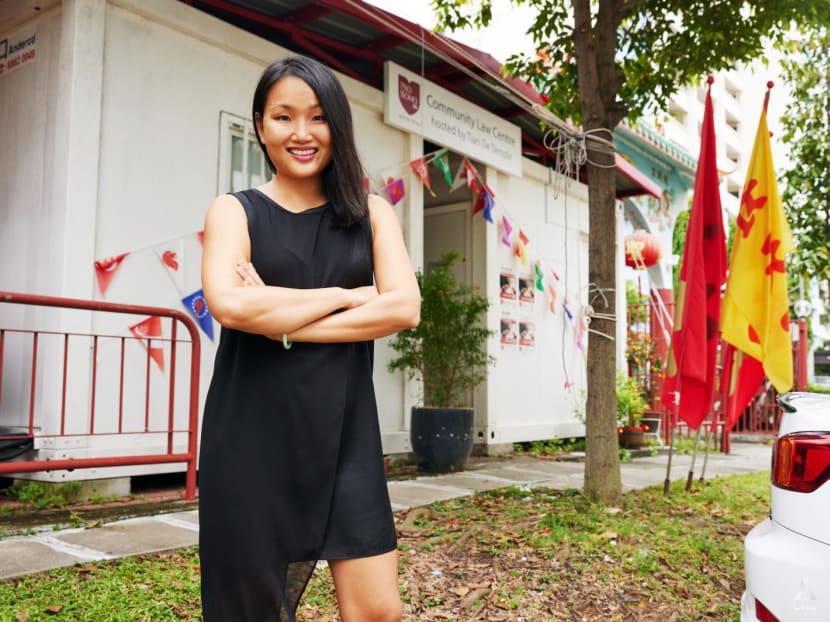
Cai Chengying, Pro Bono SG's Head of Strategy and Impact Evaluation, at the charity's first community law centre, which is situated at Tian De Temple in Hougang. (Photo: CNA/Kelvin Chia)
When former litigator Cai Chengying left her full-time job in private practice for full-time motherhood, she didn’t imagine her new office when she returned to the workforce to be in a small container at a temple in a sleepy Hougang estate – a stark difference from her previous swanky workplaces in Raffles Place.
The community law centre at Tian De Temple along Hougang Avenue 5 is the first such facility of Pro Bono SG – a registered charity and wholly owned subsidiary under the Law Society of Singapore that provides legal advice and representation for the underprivileged.
And Cai, as the first Head of Community Lawyering for the charity, oversaw the centre’s launch in January last year.
Beside the 36-year-old’s desk, a tiny window overlooks a public car park and a void deck coffee shop opposite the temple – which has served as an “informal waiting lobby” for clients due to the cramped space and lack of privacy in the two containers. In turn, the coffee shop has also told several customers about the services provided by the centre.
“This was something that wasn’t apparent to me in private practice, but in solving a legal problem, it’s not just the lawyer that’s the greatest asset,” Cai said.
Under her current role at Pro Bono SG as Head of Strategy and Impact Evaluation, which she took on at the start of June, she hopes to eventually have five such community law centres across Singapore, with the goal to make legal services more accessible. The second centre, set up in January this year, is situated at the Realm of Tranquility charity in Woodlands.
“Over the years, our collective experience was that a lot of people find it difficult to connect to services in the State Courts. They may not have devices to help them register for services online. They also may not feel comfortable stepping into a government building like the State Courts (where Pro Bono SG’s headquarters are)… It’s a bit intimidating for some of the clients,” she noted.
Some clients also have difficulties making the trip to the State Courts. One had to borrow money from her for a bus ride home, while another had cycled five hours to meet her colleague, she added.

While getting a referral from a kopitiam uncle these days might be a far cry from Cai’s past life as a partner at Shook Lin & Bok Singapore for about two years, following an almost six-year stint with Allen & Gledhill LLP, her career pivot seems almost inevitable in hindsight.
Not only had she enjoyed working on pro bono cases for years while she was in private practice, including being part of the pioneer batch seconded to Pro Bono SG in 2015, she’d also harboured a childhood dream to be “in a helping profession”.
Even then, when she joined Pro Bono SG in early 2020, less than a year after she quit private practice, she didn’t know then she would find more than a new employer. She would find where she belonged.
THE ROAD TO COMMUNITY LAW
There wasn’t just one pro bono case that changed Cai’s career trajectory, but a layering of one heartwrenching story after another over the years. While varied in scope and issue, the cases helped her understand that legal problems – and their solutions – “don’t happen in a vacuum”.
The first time she realised the impact of community lawyering, she was acting for someone with mild intellectual disability, who was charged with flashing his private parts at a resident walking past a lift lobby. Her client had “totally no clue” what was going on, and couldn’t even tell her his full name, she recalled.
The prosecution eventually agreed to withdraw the charge and give him a conditional warning. When the judgement was announced in court, her client’s family “burst into tears because they had been so stressed by the entire ordeal”, she said.
Their visceral reaction stuck with her, and helped her see that “a legal problem that affects a person doesn’t just affect that person; it affects his community”.
In another case that showed her the importance of community, Cai and her former employer acted for a foreigner who was married, and then abandoned, by her Singaporean spouse when she was pregnant in Singapore. After the woman gave birth here, she tried unsuccessfully to register her children as Singaporeans because the husband had made a false declaration that the children were not his.
“While authorities were investigating and we were helping her with her appeal to explain why the children are Singaporean in this situation, she was supported by the entire community of church members,” Cai said.
For instance, they chipped in to buy milk powder and diapers for the woman and took turns to offer her accommodation. At court hearings after she initiated divorce proceedings, a church member would come with her for support.
“It’s different, you know, having your own friend alongside you,” added Cai. “That opened my eyes to community lawyering. It’s not something that lawyers do alone. It happens in the community.”
Yet, despite being drawn to such volunteerism, Cai was hesitant when told about a job opening in Pro Bono SG by her former supervisor. The role involved legal compliance and fundraising, which she candidly pointed out to her future employer that she knew little about.
But the charity decided to take a chance on her, believing she would be a good fit. They offered her a one-month “trial period” where she could sit in the CEO’s office “like a fly on the wall” to get a sense of the work they did.
The full-time mother made up her mind. She returned to work and joined Pro Bono SG.
“Eventually, I felt that if I were to go back to work and be away from my child, I would want it to be something that I can meaningfully contribute to during those working hours, like something purposeful,” she reasoned.
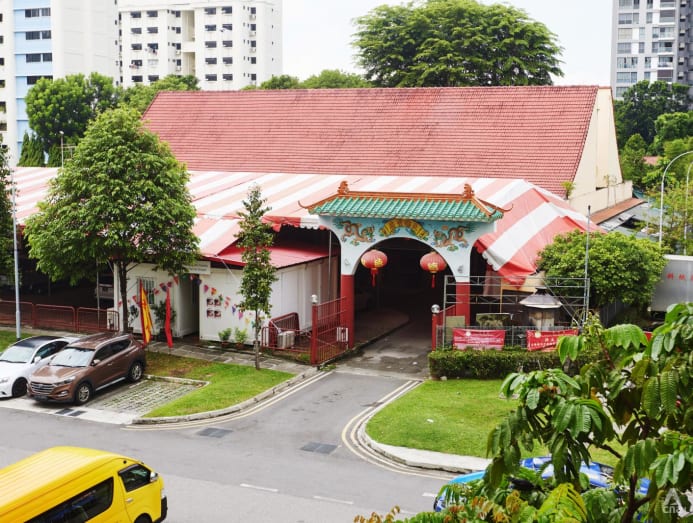
IMPROVING INFRASTRUCTURE
The idea for the centre originated from Richard Siaw, Pro Bono SG’s 2022/2023 ambassador and the managing director for law firm R S Solomon LLC.
He was then introduced to Tian De Temple’s chairman, who expressed interest in the idea, believing that a temple should extend help to the community it’s in.
Still, Cai was initially sceptical about the decidedly unique location, fearing the temple would keep away people of different faiths, races and backgrounds.
But her misconceptions were quickly debunked when she saw how the temple mirrored the inclusivity that the community law centre was championing.
For one, the temple took the initiative to remove the barrier in front of the containers, so people who might not be comfortable walking through temple grounds could access the community law centre directly from the main pavement. The temple also worked with the town council to create a concrete path, so these people didn’t have to step on the grass and mud to enter.
“I was very touched by how they interpreted their own customs and laws to accommodate us. It would be easier to say, ‘Go and block someone else’s temple’, you know?” said Cai.
And when law firm Allen & Overy LLP (now A&O Shearman) visited to learn about available volunteering opportunities, they saw the charity’s CEO Tanguy Lim taking calls in the car park for privacy. They then decided to sponsor a soundproof pod for three years, so Pro Bono SG’s lawyers could attend online court hearings more conveniently.
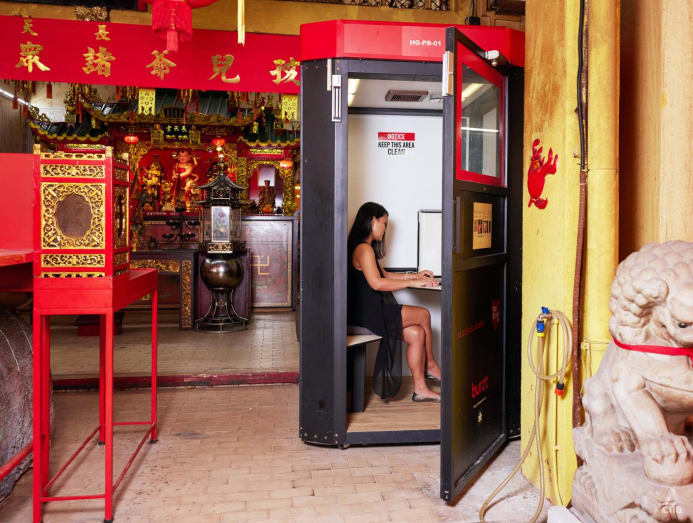
The community law centre’s unassuming set-up seemed to have worked. They landed their first client even before they officially started operations.
A man who lived within walking distance was passing by when he decided to knock on the window, curious about the two new containers at the temple. Lim, the CEO, who happened to be in the office, then told the man that it was a community law centre, where residents could get help for legal problems.
“(The man) said, ‘Wait ah’, then he ran home to get his documents and came down. Because he had been served with court papers, and he had no clue how he was involved. He was the driver, and he got into an accident, but he was driving his employer’s car,” Cai shared.
“So he was very anxious, like am I covered by insurance? Did my employer buy insurance? Our CEO helped to sort him out.”
As it turned out, this Hougang resident would be among the over 1,100 clients in need that the centre would eventually serve to date.
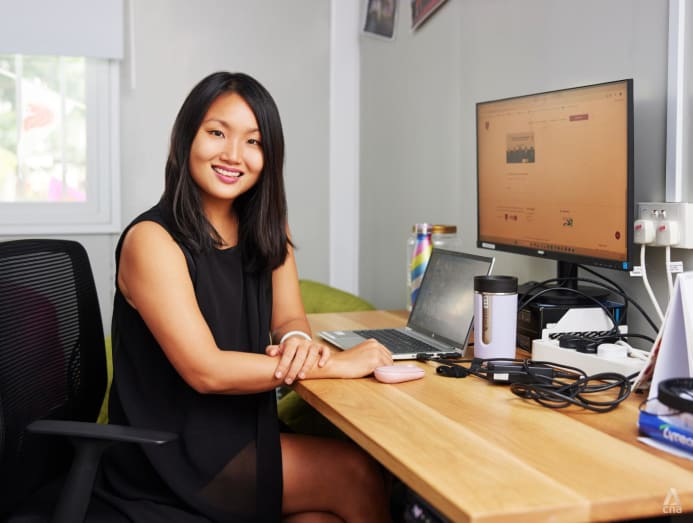
REDEFINING “NEEDINESS”
In time, when more community law centres have been built, Cai hopes both the general public and other lawyers will have a clearer understanding of Pro Bono SG’s role in the legal ecosystem.
A bulk of her job today still involves explaining what they do – plug the access to justice gaps – and what they don’t. They don’t offer general free service to anyone; potential clients have to undergo means testing to qualify. And they don’t duplicate government services offered by the Legal Aid Bureau and the Public Defender’s Office.
But what has changed more than a year since the community law centre at Tian De Temple was established, and after close to a decade of volunteer experience, is Cai’s perception of neediness.
She once believed “all clients should be financially needy to qualify for services”, but has since realised that “neediness and vulnerabilities can manifest themselves in many ways”.
“We have residents who come in and based on a preliminary assessment of their income, they should be able to afford legal services. But yet, they are as needy as the person with no money, because they don’t know how to use the internet. They don’t speak English. And they might be isolated; they have no other person to help them navigate things,” she explained.
“So I realised that hey, you know, being unaware of how to connect to legal services is a huge vulnerability. Because you are in the same position as someone with no access, no resources to connect to a lawyer. At the end of the day, both of you still don’t have legal representation.”
In fact, Cai estimates, about 20 per cent of Pro Bono SG’s clients fall into this category.
While her team can’t recommend individual private practitioners, they take the time to explain which practice areas the client’s issue comes under, and hand these clients to the Law Society’s directory of lawyers. From there, clients can narrow down which lawyer speaks their preferred language, which offices are wheelchair accessible, and which lawyers do home visits, for instance.
Most of these clients are happy to pay for a private lawyer. They simply didn’t know how to access one, Cai realised. “You can’t assume that just because people have money, they will know how to resolve the problem.”
HELPING OTHERS TO HELP OTHERS
Over the years, Cai has also changed her perspective on the role of a community lawyer. The client-lawyer relationship used to be black and white to her; clients were the ones who needed help, while lawyers were there to help them. But meeting more families taught her that every family also has strengths, in addition to their challenges.
“You must be able to (recognise) their resilience… all the efforts that they’ve made to make (their) lives better and to provide for their families, to become self-sufficient, and even to be of service to other people in the community,” she said.
“Community lawyering has changed my view on who else can help.”
So, when offered her current role in strategy and impact evaluation, she decided to embrace the challenge. The role, which is less operations-focused than heading up community lawyering, will enable her to look at Pro Bono SG’s bigger development strategy.
This involves using their existing data – from volunteer lawyers’ observations of clients to feedback from social workers on community gaps – to decide which heartlands to set up new centres.
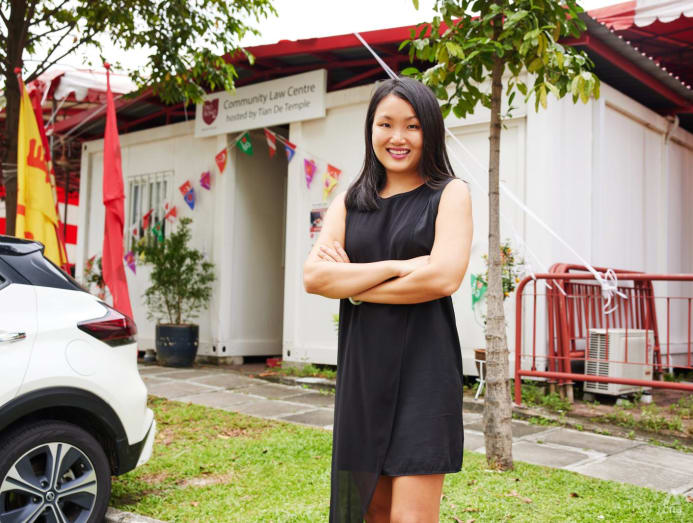
The impact she could make in a strategic role would go beyond carrying out individual meaningful acts, she believed.
“(This) kind of help has a multiplier effect. As a volunteer, I was doing one case by one case. But now I see my purpose as being able to multiply that effect, and to help others also fulfil that kind of desire to help others,” she said.
And if there were ever any doubt that Cai was made for this role, she appears to have come full circle.
She recalled that a week before the launch of the community law centre at the temple, her mother decided to drop by the new office, figuring it could do with some sprucing up. But when she showed up to the temple, she was “quite shocked”.
Apparently, her mother had visited the temple decades ago for an equally meaningful cause.
“(My mum) said, ‘Hey, do you know, I actually prayed to this temple for your birth?’ She said she had a miscarriage, then her mum – my grandma – brought her here to pray. And then I was born,” Cai said.
“Yeah, it’s very, very uncanny.”
This article was originally published on ChannelNewsAsia, CNA News online. Its inclusion on this website is solely for education purposes.

No comments
Share your thoughts! Tell us your name and class for a gift (: